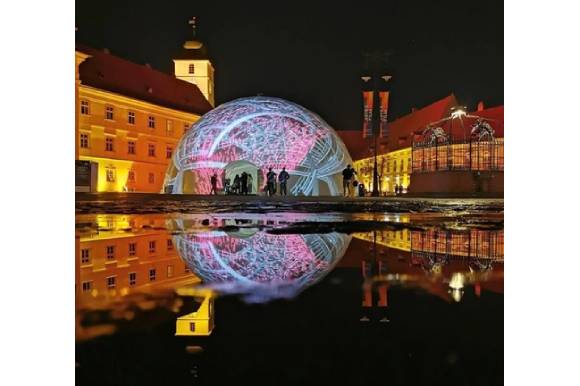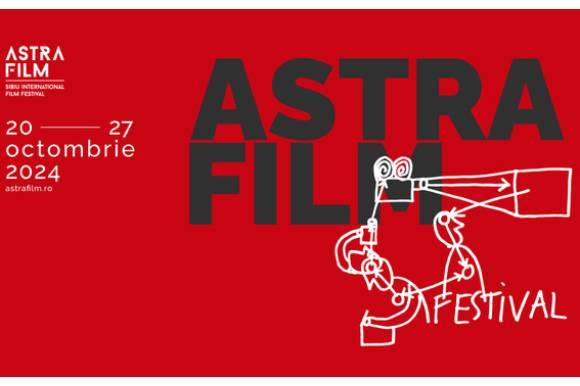The International Documentary Festival Astra Film (Sibiu, October 20-27, 2024) offers audiences more than 100 films produced in countries across all continents. Most of the productions will be presented for the first time in Sibiu. The list of films in the four competitive sections can be found here: https://www.astrafilm.ro/en/2024/official-selection-astra-film-festival. The organizers are offering early bird passes at special prices until September 10th. Details: https://www.astrafilm.ro/en/news/early-bird-aff2024.
"We eagerly look forward to being together again for the 31st year of the festival. I think this year's selection is one of the most valuable, and I am convinced that our audience, the Astra Film Festival community, will fill the cinemas and applaud the brave and talented directors who have entrusted us with their productions," said Dumitru Budrala, director of Astra Film Festival.
ROMANIA. The selection for the Romania competitive section brings to the forefront uncomfortable, even disturbing realities of recent history that we tend to avoid discussing, but which are catching up with us. It also features life stories reflecting the realities of our society: minors left to fend for themselves and forced to take their destinies into their own hands, vulnerable elderly people facing inhumane situations, young gay individuals seeking love, acceptance, and equal rights, or seemingly perfect families struggling with inner turmoil that leads to radical actions.
Six out of the 11 selected films are premieres (four world premieres and two national premieres). World premieres: Bloodied Photographs (dir. Copel Moscu, 2024), An Almost Perfect Family (dir. Tudor Platon, 2024), Forbidden (dir. Anelise Salan, 2024), and Family Movies (dir. Dan Curean, 2024). National premieres: Triton (dir. Ana Lungu, 2024), 24 Hours (dir. Harald Friedl, 2024). Other films in the Romania competition: Imaginary Youth (dir. Ruxandra Gubernat), A Cautionary Tale (dir. Ilinca Călugăreanu, 2024), Zagor's Death (dir. Adrian Dohotaru, 2024), Between Silence and Sin (dir. Diana Nicolae, 2024), Alice On & Off (dir. Isabela Tent, 2024), Maia - Portrait with Hands (dir. Alexandra Gulea, 2024), As The Clock Runs (dir. Fecső Zoltán, 2023).
CENTRAL AND EASTERN EUROPEAN. The productions in this section evoke specific realities, discussing the dissolution of the industrial heritage in former communist countries captured in a post-apocalyptic landscape (Ship - dir. Elvis Lenić), absurd gifts during election campaigns in Eastern European states (Smiling Georgia - dir. Luka Beradze), surprising customs from the ancestral world in the mountains of Albania (House With A Voice - dir. Kristine Nrecaj, Birthe Templin), or a unique community in Germany, the Sorbs (We Call Her Hanka - dir. Grit Lemke).
The dominant theme remains the war in Ukraine (Songs of the Slow Burning Earth - dir. Olha Zhurba; Photophobia - dir. Ivan Ostrochovský and Pavol Pekarčík). In Of Caravan And The Dogs (dir. Aslkod Kurov, Anonymous1), we get a unique perspective from behind the scenes of the resistance by journalists and activists in Russia, while the migrant crisis and the echoes of political tensions in Europe are felt at the borders of Poland (Forest - dir. Lidia Duda). In the film TATA, premiered in Romania, the protagonist's daughter manages to help her father receive compensation for the severe abuses he suffered over the years from his employer in Italy. The grim situation of Eastern European workers in Western Europe is exposed in Limits of Europe (dir. Apolena Rychlíková). The world premiere in this section is Ioana Grigore's film (Leo Records: Strictly for Our Friends), about resistance through jazz music during the communist regime.
NEW VOICES IN DOCUMENTARY CINEMA. Produced in countries like Austria, Canada, Czech Republic, France, Georgia, Germany, Iran, Norway, Portugal, Democratic Republic of Congo, Slovakia, USA, and Ukraine, the films in this section (curated by Andreea Mihalcea) privilege a polyphony of perspectives and female protagonists (Flying Lessons - dir. Elizabeth Nichols). They describe individual histories of female filmmakers that become platforms of resistance and opposition by denouncing patriarchal power relations in Iranian society (My Stolen Planet - dir. Farahnaz Sharifi; Shahid - dir. Narges Kalhor), explore everyday life and queer identity (I'm Not Everything I Want to Be - dir. Klára Tasovská), or present the transformation of education into indoctrination as a tool for control and nationalism in Georgia (Ever Since I Knew Myself - dir. Maka Gogaladze).
The post-Soviet space is also relevant in several films in this section (Fragments on Ice - dir. Maria Stoianova; Intercepted - dir. Oksana Karpovych), with other important coordinates being social analysis (Savannah and the Mountain - dir. Paulo Carneiro), the appeal to religion and solidarity in the context of post-colonialism and the interests of multinational corporations and geopolitical entities in Portugal and Congo (Rising up at night - dir. Nelson Makengo), or filtering collective mentality and imagination through the intersection of myth, cultural iconography, and the socio-political history of the United States (Henry Fonda for President - dir. Alexander Horwath).
DOCSCHOOL. Student films at AFF display both maturity and freshness, addressing current topics and seeking original approaches. They are produced by students from around the world, from institutions such as: the Academy of Music, Theatre, and Fine Arts in Chișinău, the Doc Nomads consortium (Belgium, Portugal, Hungary), Filmways from Bucharest, Hasifa from the Open University of Israel, HELB from Kenya, the Higher Institute of Arts INSAS and LUCA School of Arts in Brussels, the Sam Spiegel Film and Television School in Jerusalem, Tomas Bata University in the Czech Republic, UNATC in Bucharest, the University of the Arts Berlin, the University of Television and Film Munich, and Wajda Studio in Warsaw.
 Several dozen other films will be screened as part of Astra Film Junior (education through documentary film), in the training and development program Doc Tank, in the immersive space of the Cinema DOM in Piața Mare, and throughout the numerous special programs of the festival. The public will also be able to attend exhibitions, concerts, parties, and surprise events. Early bird passes can be purchased until September 10th. Details: https://www.astrafilm.ro/en/news/early-bird-aff2024.
Several dozen other films will be screened as part of Astra Film Junior (education through documentary film), in the training and development program Doc Tank, in the immersive space of the Cinema DOM in Piața Mare, and throughout the numerous special programs of the festival. The public will also be able to attend exhibitions, concerts, parties, and surprise events. Early bird passes can be purchased until September 10th. Details: https://www.astrafilm.ro/en/news/early-bird-aff2024.
About Astra Film Festival
The Astra Film International Documentary Film Festival in Sibiu, launched in 1993 as an innovative project, is one of the most important non-fiction film festivals in Europe, included by the European Film Academy on the list of festivals eligible to make direct nominations for the European Film Awards.
Astra Film Festival is under the High Patronage of the President of Romania, organized by Astra Film, CNM Astra, and the Astra Film Foundation.
Strategic partner: Ministry of Culture. With the support of the Sibiu County Council, the National Center of Cinematography, the Consulate of the Federal Republic of Germany in Sibiu, ICR, AFCN, and the Union of Filmmakers. The event is co-financed by the Sibiu Local Council through the Sibiu City Hall.
Sponsors: ING Bank, Groupama, Mecatronics, Ursus, Burn, Artesana, Luthelo, Decathlon, TheRefresh




















